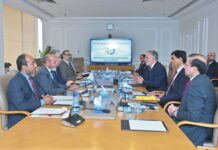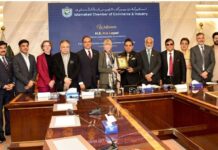Spokesman Report
Islamabad: Business leader and former President of the Islamabad Chamber of Commerce and Industry (ICCI), Dr. Shahid Rasheed Butt, said on Monday that global institutions are supporting Pakistan’s economic policies and that the world’s perception of Pakistan is changing.
Although Pakistan’s economic indicators are improving, he stressed the urgent need to reduce reliance on aid and loans.
He added that different countries that used to avoid Pakistan due to economic and other considerations would soon start bilateral trade and investment in Pakistan.
Shahid Rasheed Butt said in a statement issued here today that the economy is stabilising and pushing the country forward while the stock market is booming.
The business leader stated that the country’s exports had increased by 14% and that digitizing the FBR is expensive, but it will benefit the economy greatly.
He demanded the completion of talks to privatize Pakistan International Airlines and other state-owned businesses, with the aim of selling these failing enterprises to save billions of rupees.
In Pakistan, the number of filers is increasing, and the time has come to bring untaxed and low-taxed sectors, as well as wealthy individuals, into the tax net.
However, he said, there is an urgent need to broaden the tax net, as the government is currently spending seventy percent of revenue to pay interest on loans, which is not sustainable.
He emphasized that Pakistan’s tax system is ineffective, unfair, fragmented, and leaves out entire sectors of the economy, which exacerbates structural economic imbalances and is a recipe for disaster.
He noted that Pakistan has been unable to expand taxation. Despite several local and donor-supported reform attempts, the tax-to-GDP ratio continues to hover around 10% of the GDP. The inability to expand tax revenue contributes to significant public service delivery gaps.
In Pakistan, over 20 million people lack access to clean water, nearly one in three people lacks a decent toilet, approximately 40% of children under the age of five experience stunted growth, and more children are not attending school than in India and China, he lamented.
Borrowing cannot improve the situation; therefore, an expanded tax net is necessary. The elites are not prepared to pay taxes, but Pakistan has no other choice, he noted.
Currently, the government is providing power subsidies, lowering the cost of basic goods, and slashing the price of fuel, offering some respite to the people. However, the scarcity of resources prevents further action.
By skewing the tax system towards import and consumption taxes, Pakistan worsens its structural economic imbalances. Pakistani firms, for example, are more incentivised to sell domestically to a protected market than to compete globally.
These imbalances are further exacerbated by the undertaxation of agricultural income, urban properties, and retailers. By undertaxing properties, Pakistan’s tax system incentivises firms and households to invest in urban property as opposed to sectors that may provide employment and generate exportable goods or services.
According to a study, with a population of over 100 million, all of Punjab in Pakistan collects less urban property tax than Chennai in India, which is home to about 10 million people. The agriculture sector is also undertaxed. Agriculture contributes to nearly one fifth of the GDP; it accounts for less than 1% of national tax revenue, he explained.
He said that research by the World Bank shows that a 10% import duty in Pakistan increases profits from selling domestically compared to exporting. This feeds into Pakistan’s structural challenge of low exports, which are the core of its frequent balance of payments crises.
He said that the Chief Ministers of all provinces should focus on giving people better health care, schooling, and other services, and avoid useless protests that only harm common people.
Mr. Butt said that the Shanghai Cooperation Organisation meeting must go as planned, and no one should be allowed to make things worse in the country.



